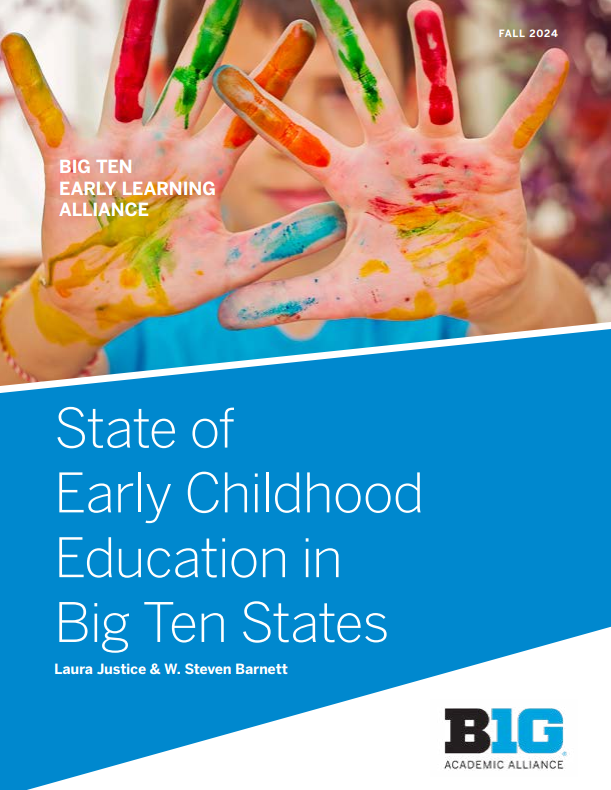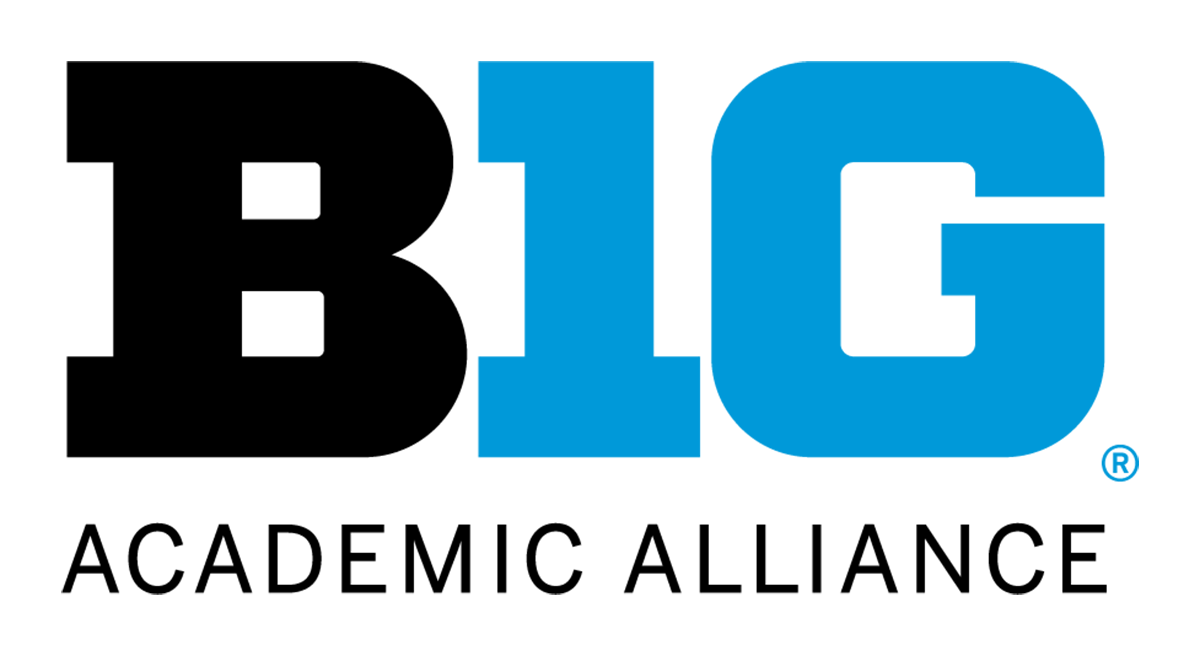Analysis briefs
At least twice each year, the Big Ten Early Learning Alliance will produce an analysis brief on a particular topic of research in early childhood. The briefs are designed to aid policymakers in the states and communities where our universities are located, using data from research undertaken in our communities and relevant to the pressing concerns of our communities.
BIG TEN EARLY LEARNING ALLIANCE BRIEF Number 3 — Winter 2025
Head Start and Outcomes for Children and Families: How Head Start Serves the Big Ten States
Anna J. Markowitz, Alejandra Ros Pilarz, David Purpura, Terri Sabol, & Dawn Thomas

Big Ten states leverage substantial federal Head Start dollars to provide early care and education, and family support services, for more than 310,000 children annually. Decades of research provide strong evidence that Head Start participation improves children’s development in the early years and helps them enter school more ready to learn, and Head Start programming supports caregivers’ parenting skills and improves their educational and labor market outcomes.
Click here to view the brief.
BIG TEN EARLY LEARNING ALLIANCE BRIEF Number 2 — Winter 2025
Early learning standards are intended to lay a foundation for school readiness and long-term success. States, however, organize the ages/developmental stages they include in their early learning standards in different ways, and early learning standards in mathematics vary substantially across Big Ten states.
Click here to view the brief.
BIG TEN EARLY LEARNING ALLIANCE BRIEF Number 1 — Fall 2024
State of Early Childhood Education in Big Ten States
Laura Justice & W. Steven Barnett
The period of early childhood from birth to age 5 years is potentially the most important for enhancing development over the human lifespan. This brief describes the characteristics of young children (0 to 5 years) in Big Ten states; examines the current state of early childhood education among these states; and discusses trends and opportunities for early childhood education in these states.
This brief is available either as a webpage or as a downloadable PDF.
Click here to view the web version of the brief.

Click here or on the image above to download a PDF of the brief.
Online discussions on early childhood research and policy
Throughout the year, the Big Ten Early Learning Alliance is holding online discussions on critical topics in early childhood research and policy. These discussions, which are free and open to the public, are designed to bring the latest scientific findings to a broader audience, translating research into workable solutions to improve outcomes for young children in the Big Ten states.
September 2025: State of Preschool in Big Ten States
For over two decades, the NIEER State of Preschool Yearbook has served as the leading resource for tracking the progress of state-funded preschool programs across the United States. This event offered a focused exploration of the 2024 Yearbook findings, with a special emphasis on Big Ten states. State government administrators from Michigan, California, and Iowa also set out the details of their current programs, as well as prospects for the future.
Watch the recording on our YouTube channel.
Extra resources:
April 2025: Parent Engagement and Partnerships in Early Childhood: Research from Across the Big Ten
This event, featuring experts from the Big Ten Early Learning Alliance, discussed current research on parent engagement and partnerships and outlined its vital connection to policy and practice.
Watch the recording on our YouTube channel.
Extra resources:
March 2025: Early Math Learning in Big Ten States
This event examined a multi-level view of early math learning, including the big picture of early math standards in Big Ten states, assessing math learning in the classroom and at home, and the brain science of numerical development.
Key Takeaways:
- States should consider aligning early math standards.
- Math assessment in preschool can be fun and instructionally relevant.
- Children recruit different systems in the brain as a function of their home experiences.
Watch the recording on our YouTube channel.
Extra resources:
- For more information about LLAMA, visit the project website at LLAMApreK.com
December 2024: Reflecting on the Perry Preschool and Chicago Longitudinal Studies
The Perry Preschool Project and Chicago Longitudinal Study are two landmark studies demonstrating the value of high-quality early childhood education for children and society. With data collection starting in 1962, the Perry Preschool Project was one of the first real cohort studies in the field of early childhood education. Kicking off in 1986, the Chicago Longitudinal Study is the largest and longest running. Featuring experts from the Big Ten Early Learning Alliance, this event reflected on the value of these two studies and how they apply to today’s current context.
Watch the recording on our YouTube channel.
Extra resources:
October 2024: The State of ECE Data in Big Ten States
In this panel, experts from Illinois, New Jersey, Ohio, and Georgia discuss barriers and opportunities surrounding the use of data systems that states maintain about the services provided to children before they enter kindergarten. Three themes arose from the discussion: 1) securing funding to sustain these data systems; 2) finding the right experts to build and maintain data systems; 3) building trust between state agencies and the stakeholders (such as care and early education providers, as well as researchers and policy advocates) who provide, share and use state data.
Watch the recording on our YouTube channel.
Extra resources:

 American Family Insurance Dreams Foundation believes that equity in education — including early education and care — can be a pivotal lever to break cycles of generational poverty for students and their families. Early education and care are leading priorities in our Equity in Education investment strategy. We invest in equity-centered innovation focused on a strong and diverse educator pipeline, research and coalition-building, direct family and community services, and business/funder roundtables.
American Family Insurance Dreams Foundation believes that equity in education — including early education and care — can be a pivotal lever to break cycles of generational poverty for students and their families. Early education and care are leading priorities in our Equity in Education investment strategy. We invest in equity-centered innovation focused on a strong and diverse educator pipeline, research and coalition-building, direct family and community services, and business/funder roundtables.
